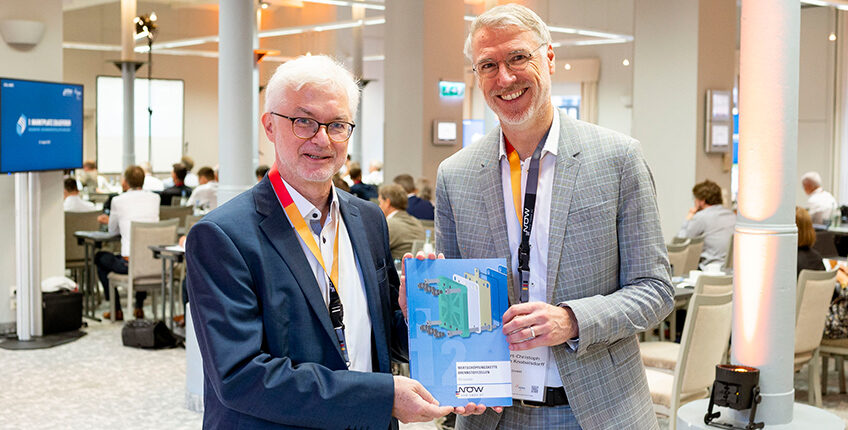With the meta-study on the fuel cell value chain (Wertschöpfungskette Brennstoffzelle), NOW GmbH is today presenting a comprehensive cost analysis at the Supplier Marketplace in Berlin. The aim of the study is to identify the causes of the high additional costs for current fuel cell systems. The findings: The most important factor for a sustainable reduction in production costs is the transition to large-scale production.
Fuel cells can make a decisive contribution to the decarbonisation of the global energy economy. Nevertheless, despite the lengthy development to production-ready systems, the costs on the market remain persistently high and a significant market penetration as well as cost reductions have not taken place over the past years. In order to explore the reasons for this, NOW GmbH commissioned a meta-study to analyse the entire value chain of fuel cell systems on behalf of the Federal Ministry of Digital and Transport (BMDV – Bundesministerium für Digitales und Verkehr). With the cooperation of the VDMA (Fuel Cells Working Group), the study was conducted by the INC Invention Center, Fraunhofer IPT and umlaut SE.
Largest potential through scaling up to series and mass production
The study provides a comprehensive overview of the traceable structures and, as a meta-study, analyses different scenarios on the basis of leading surveys. The focus is not only on the PEM fuel cell, but also on the SOFC. By examining the various components and their production costs, the main cost drivers of fuel cell systems were identified in detail, as well as the potential for cost reductions.
The study concludes that the greatest potential lies in reducing costs by scaling up production towards series and mass production. Material costs and, above all, manufacturing costs could be reduced by increasing the number of units. Depending on the components and systems, costs could be reduced by factors of between 10 and 20. As recommendations for action, the authors of the study suggest that policy makers should support industry in providing sustainable products for the market and create incentives for up-scaling.
Download the “Fuel Cell Value Chain: Meta-study (in German)” (PDF)
Study supplemented by deep dives and presentation in an online seminar
The ongoing addition of targeted deep dives is intended to take a closer look at particularly important components identified in the study, by presenting materials, manufacturing processes and possible process pathways in a comprehensible manner.
On 9 September, interested parties will have the opportunity to participate in a detailed presentation of the study. In this online seminar, the authors of the study will present their results and discuss these with the audience.
Image source: Franz Josef


